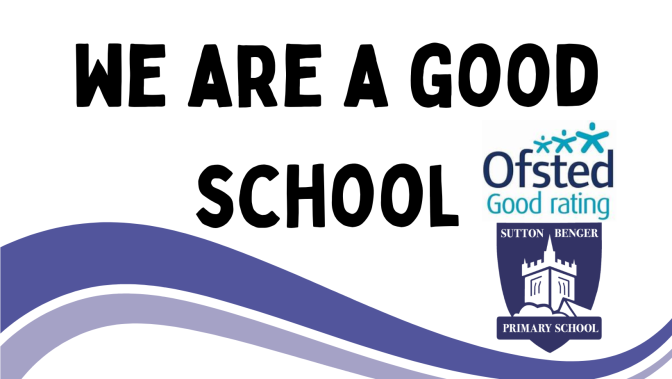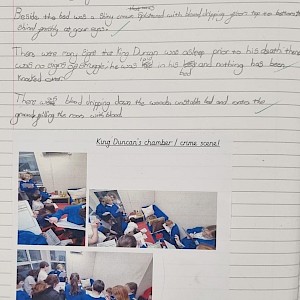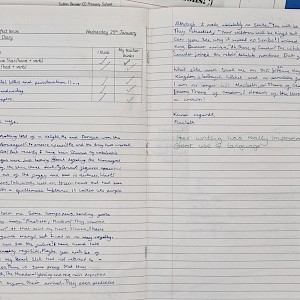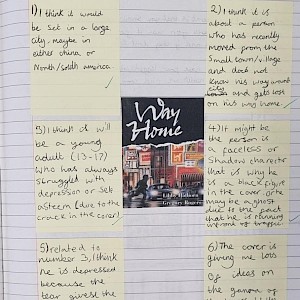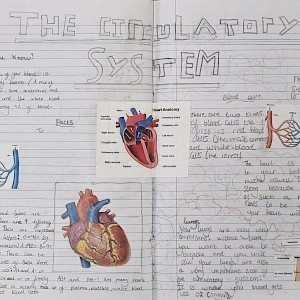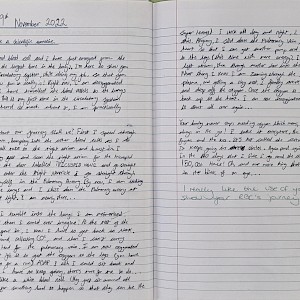Writing Curriculum Approach
INTENT
At Sutton Benger School we believe that writing is a key skill for life. Our aim is for our children to become confident, articulate and accurate writers so that they have the skills to communicate effectively now, and in the future. We want them to be able to write in a range of styles and for different purposes, and for their writing to have an intended audience. Our writing curriculum is deliberately vocabulary-led, as we believe this is vital to enable our children to become inspired and skilled writers. We ensure all our children develop a genuine love of language and the written word.
Our writing approach is structured in a way that inspires and engages our children. It is a planned journey of carefully prepared experiences and teaching that gives confidence and makes our children ‘authors’. Our writing curriculum encourages creativity and engages pupils in order to motivate and build stamina for independent writing. The knowledge, skills and literary/grammar devices for writing are explicitly taught and modelled to ensure learners can apply these skills independently. We model and encourage proofreading and editing as we know that writing is a craft; something to be refined and improved.
IMPLEMENTATION:
Writing and reading are closely linked and high quality texts are the driver of our English curriculum. We build progressive understanding of the key concepts of writing and expose our children to a wide purpose for writing. Our curriculum is vocabulary-rich and this is developed through our writing curriculum. Children are given opportunities to develop and practice their vocabulary and oracy so that they become confident, articulate writers.
Our curriculum is blocked as units of learning within a 39-week curriculum map. The children are fully immersed in a curriculum unit and writing is woven throughout them. Much of our writing is taught using high-quality texts, and links are made across the curriculum to ensure that children’s learning is relevant, meaningful and purposeful. Children are expected to transfer their key unit knowledge, genre knowledge, SPAG knowledge and high level vocabulary into their writing and vice versa.
Class teachers will plan a creative sequence of lessons that will allow the children to be exposed to age-related expectations for writing within a range of texts. This ensures our children learn through small steps and have time to be guided through and practise newly learned skills. Scaffolds will be provided through the use of quality examples and modelling. Children will also use retrieval and recap to bring existing knowledge forward, to build new knowledge and to embed the new writing style, grammar and vocabulary.
The planning sequence will consider many aspects such as:
- using a creative stimulus to bring the children’s writing to life;
- the use of high quality text from a range of authors and genres that includes high level vocabulary;
- exploring the features of different text types and their grammatical features;
- investigating good quality examples to understand the genre more deeply;
- providing opportunity to deliberately practise skills then to apply these in extended pieces of writing;
- ensuring that prior learning is checked and built upon;
- using shared writing, modelled writing and guided writing to teach a range of skills and techniques, which enable the children to develop their own writing style using appropriate grammar, punctuation and ambitious vocabulary choices;
- modelling the writing process and demonstrating the high standards expected of all children. This scaffolds and supports children’s writing and makes expectations clear;
- encouraging children to orally rehearse before writing;
- use of a working wall to display the children’s ideas and supports to aid the various stages of the writing process, as well as show good quality examples of the text type and vocabulary being produced;
- self-assessment and opportunities to read and edit own work is modelled and taught. It is used to help our children improve their writing by identifying gaps, recognise errors and visibly see where they can improve.
Writing in the EYFS and Year 1
Children’s love of writing is fostered in the EYFS using role play and mark making opportunities. These writing opportunities are developed through the use of ‘in the moment planning’, objective led planning and enhanced provision, all of which develop key writing skills through the child’s own play. Direct teaching of phonemes, GPCs, segmenting to write and writing common exception words using a high quality SSP, ‘Unlocking Letters and Sounds’.
The systematic teaching of phonics has a high priority throughout EYFS and Key Stage 1. We begin our children’s writing journey by the delivery of a high quality SSP - ‘Unlocking Letters and Sounds’. Our children learn to build on their growing knowledge of the phonetic code, mastering all phonemes and their corresponding graphemes, blending these to read, learning common exception words and ensuring fluency when writing sounds, words and books.
Handwriting
It is paramount that children are taught correct letter formation from the beginning of their time in school. This begins in the EYFS through the delivery of a high quality phonics programme, ‘Unlocking Letters and Sounds where there is a focus on teaching children the correct formation when writing graphemes. The children are also taught to sit correctly providing the best posture for writing and to hold the pencil in the correct position. We role model the high standard of pre-cursive then cursive and the children are then expected to use this. It is taught and deliberately practiced regularly, and linked meaningfully to units of learning and new vocabulary. Teachers are expected to model the school’s handwriting style when marking children’s work, writing/modelling on the board and on displays around school.
IMPACT:
Children at Sutton Benger CE Primary School enjoy ‘Being Writers’ and flourish within our curriculum. The impact of our writing curriculum is that our children will have the knowledge and skills to be able to write successfully for a range of purposes and audiences. Through the progressions of the writing sequence form our earliest years to Year 6 our children have their skills built upon every year, this consistent approach ensures that our children are confident writers with the ability to plan, draft and edit their own work.
By the end of Key Stage 2 they will have developed their craft and enjoy writing, they can manipulate language for a creative effect, include grammar and punctuation to achieve the desired result and end with a detailed coherent piece which they show great pride in. As all aspects of English writing are an integral part of the curriculum, writing cross-curricular will also have a high standard and these skills taught are being transferred in all subjects. This shows the consolidation of skills and a deeper understanding of how and when to use specific language, grammar and punctuation.
